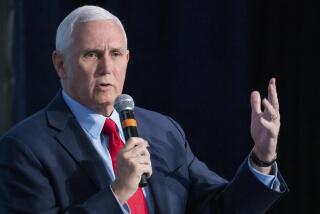S. African Ex-President Faces Trial Over Refusal
- Share via
JOHANNESBURG, South Africa — In a highly charged confrontation between South Africa’s old and new guard, authorities announced Wednesday that former President Pieter W. Botha will be prosecuted for refusing to testify at a government hearing about crimes of the apartheid era.
Regional prosecutor Frank Kahn ordered Botha to appear in court Jan. 23 on charges of ignoring a subpoena from the Truth and Reconciliation Commission. The government panel, which has been investigating human rights abuses that occurred under the apartheid system of racial separation, has summoned Botha on three occasions, but the 81-year-old retired head of state has refused to appear.
“I have decided that a prosecution in this matter is warranted, not only in law but in the public interest,” Kahn said at a news conference in Cape Town.
Botha is the highest-ranking official in the formerly white-run South Africa to face criminal charges since the peaceful transition to black rule in 1994. If convicted, the erstwhile defense minister, prime minister and president could be imprisoned for two years.
There have been efforts to head off the divisive test of wills for weeks now, with President Nelson Mandela privately telephoning Botha’s children in the hope of gaining a sympathetic ear. Mandela apparently made some headway, but even Botha’s intervening children were unable to persuade him to back down.
“We had hoped against hope that matters would not have reached this eventuality,” said Alex Boraine, deputy chairman of the truth commission.
Commission officials, who made the unusual request for criminal charges last month, issued a last-minute plea to Botha on Wednesday to cooperate with their investigation. In exchange, the officials said, they would drop the criminal action.
“Even at this eleventh hour, I would appeal to Mr. Botha to change his mind and agree to appear,” Boraine said. “If he refuses to do this, then the law must take its course. No one is above the law--neither the lowliest nor the highest in the land.”
Botha was unavailable for comment. But his attorney told prosecutors that the former president would appear in court Jan. 23 to answer charges against him.
In the past, Botha has explained his absences in a variety of ways, invoking a medical excuse, challenging a subpoena on technical grounds and rejecting the legitimacy of the truth commission, which he regards as an inquisition meant to humiliate white South Africans.
The decision to prosecute the last of the ironfisted leaders of the white minority regime sparked an immediate outcry from right-wing white groups dissatisfied with the country’s transformation.
“If they take him to jail, they are going to have to take a few of us with him,” said Pieter Aucamp of the Conservative Party, a small Afrikaner party that shares Botha’s disdain for the truth commission. “Unfortunately, in the history of this country, the Truth and Reconciliation Commission will be written down as one of the biggest contributors to tensions between Afrikaners and non-Afrikaners.”
But advocates of the commission praised the prosecution as a major victory for the controversial panel, created two years ago to piece together facts about political crimes committed by both whites and blacks before the country’s first all-race elections in 1994.
“The decision will reinforce the confidence of the majority of people in the [truth commission] process,” said Ronnie Mamoepa, spokesman for the ruling African National Congress.
Commission investigators want to question Botha about operations of the State Security Council, the top organ of white repression during his rule in the 1980s. The former president has submitted about 1,700 pages in response to written questions, but commission staff described the responses as more rhetorical than direct.
“We could easily have taken the attitude that this old man is senile and should be left alone,” said Dumisa Ntsebeza, head of investigations. “But you can’t do that. We need the information he has to tell.”
More to Read
Sign up for Essential California
The most important California stories and recommendations in your inbox every morning.
You may occasionally receive promotional content from the Los Angeles Times.













